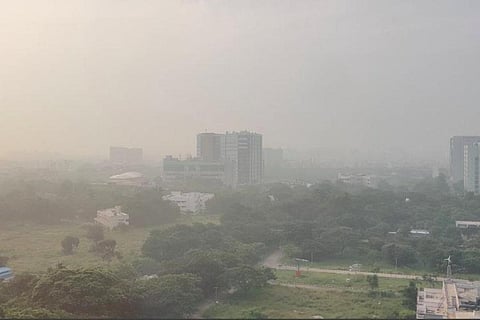

Youngsters and children from north Chennai have demanded an indefinite moratorium on setting up new industries or expanding existing industries in the region owing to the existing levels of air pollution. They have also demanded immediate action against the industries that are responsible for causing air pollution between Manali and Pulicat in the northern region of Chennai. The concerns of these youngsters stem from a study they were a part of, conducted by Chennai Climate Action Group, a youth-led environmental justice collective. This independent collective analysed over 18 lakh hours of emissions data of six big industries in north Chennai, and found that they had violated the emission norms set by the Tamil Nadu Pollution Control Board (TNPCB) for almost 60% of the year 2019 — almost 209 days in a year.
The Chennai-based group, which advocates for the rights of marginalised, under-represented and communities of current and future generations of human beings and other life-forms, analysed the hourly emission data obtained for the period of January 1 to December 12 in 2019 (8,376 hours) for all chimneys. The threshold value for emissions set by TNPCB differs from unit to unit, company to company. They studied the emission data of TANGEDCO’s North Chennai Thermal Power Station (NCTPS) Stage I, NTECL Vallur power plant, Chennai Petroleum Corporation Ltd (CPCL), Tamil Nadu Petroproducts Ltd (TPL), Manali Petrochemicals Ltd (MPL) and Madras Fertilizers Ltd (MFL). The data was obtained through the Right To Information Act.
According to the study, it was found that Madras Fertilizers Ltd (MFL) violated the air pollution norms for 77% of 2019 while not monitoring the ammonia emissions for 71% of the whole year. The company had not recorded the emissions of Hydrogen Fluoride for 62% of 2019 either. The group said that Hydrogen Fluoride emissions, if left unchecked, can cause widespread damage like the Bhopal gas tragedy.
Similarly, Chennai Petroleum Corporation Ltd (CPCL) had violated emission standards for 65% of the time in 2019. The group also said that NCTPS Stage 1 had violated emission norms for 58% of the times while Unit 1 was not compliant for 88% of the year. NTECL had also violated emission norms for 41% of the time in 2019 and the emission levels of Sulphur dioxide (SO2) exceeded permitted limits for a whopping 82% of the year 2019.
The report also highlighted the fact that several industries — new and expansion of existing ones — have been planned in the region in the coming years. “At least 3,000 MW (megawatt) of coal-fired power generation capacity, a plastics industrial estate, a petrochemical industrial township in Ponneri, and a 320 tonnes per annum mega port (nearly eight times the combined capacity of the Chennai Port and Kamarajar Port) are just a few activities planned for this region. Such developments will drastically worsen the stress on water resources, air quality and health in the region, and expose residents to a heightened risk of disasters — including floods, gas leaks and vulnerability to various diseases,” said the study, which is authored by Sharadha Narayanan, Kanishk Gokul, Karthik Gunasekar and Nityanand Jayaraman.
Apart from an indefinite ban on any and all industrial developments in the region, the study group also demanded that the TNPCB officials concerned be held accountable for their failure to enforce the laws in place around emission. “TNPCB, which has the mandate to prevent and control pollution, is dysfunctional, and the Greater Chennai Corporation, which has a mandate to protect public health, is indifferent,” it said. The report also demanded that the health officials of the Greater Chennai Corporation (GCC) ensure that public health is not affected in the region due to the operation of these heavy industries.